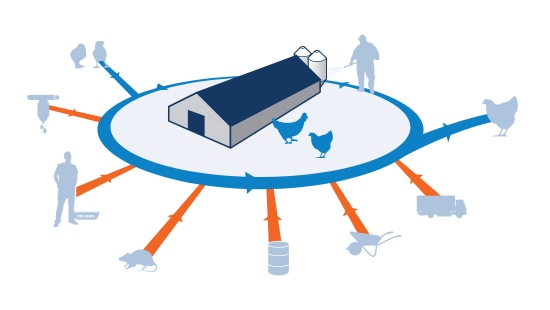
Overdracht en preventie van de Afrikaanse varkenspest
Afrikaanse varkenspest is een zeer besmettelijke, zich snel verspreidende en dodelijke virale ziekte die gedomesticeerde varkens en wilde zwijnen treft; er is geen remedie of vaccin.
AVP bedreigt de productie en het bestaan van varkenshouderijen en boeren moeten een proactieve aanpak volgen en beproefde methoden gebruiken om hun vee te beschermen.
Ontdek hoe Afrikaanse varkenspest wordt overgedragen en welke maatregelen u kunt nemen om te voorkomen dat AVP op uw bedrijf wordt geïntroduceerd.
Afrikaanse varkenspest bij varkens
Het AVP-virus hecht zich aan kleding, apparatuur en voertuigen en overleeft in veevoer, water en vlees.
Varkens raken besmet met Afrikaanse varkenspest door:
- Direct contact met een met AVP besmet dier of karkas
- Gebeten worden door een zachte teek (specifiek voor Afrika)
- Het eten van keukenafval, voedselresten of vleesproducten van dieren die besmet zijn met AVP
- Verontreinigde materialen van jagers, landbouwmaterialen of transportvoertuigen
- Overdracht door bijtende insecten
Symptomen: hoge koorts, verlies van eetlust, lethargie, huidbloeding en bloederige diarree; acuut sterftecijfer

Productinformatie
Neem contact op met uw lokale verkoopvertegenwoordiger voor meer informatie over de beste oplossingen die er zijn om aan uw behoeften te voldoen.
Hoe Afrikaanse varkenspest bij varkens te voorkomen
Een bioveiligheidsprogramma met hoogwaardige reinigings- en desinfectieproducten en -protocollen is van cruciaal belang om uw bedrijf te beschermen tegen AVP.
De belangrijkste gebieden van bioveiligheid voor de Afrikaanse varkenspest zijn toegangs-, transport- en stalhygiëne, drinkwaterhygiëne en reiniging en desinfectie van het drinkwatersysteem.
Tips om Afrikaanse varkenspest te voorkomen
1. Geef uw dieren nooit afval, etensresten of huishoudelijk afval.
2. Train alle medewerkers, bezoekers en vrachtwagenchauffeurs om de juiste hygiëne
producten en -protocollen te gebruiken; een goede training is de sleutel tot een goede hygiëne gewoonten.
3. Plaats laarzenbaden buiten de stal, bij elke ingang, en zorg ervoor dat ze worden goed onderhouden.
4. Zorg ervoor dat transportvoertuigen die naar uw boerderij komen, worden schoongemaakt en op de juiste manier gedesinfecteerd.
5. Plaats desinfecterende wielbaden en sproeibogen bij de ingang van uw bedrijf om introductie en overdracht van het virus via vrachtwagens te voorkomen.
6. Reinig en desinfecteer uw voersilo's en drinkwaterleidingen na elke cyclus, zodat het virus zich niet kan verspreiden via voer en drinkwater.
7. Neem monsters van uw drinkwaterbron om er zeker van te zijn dat dit niet verontreinigd is.
Webinar over Afrikaanse varkenspest

AVP met bioveiligheid aanpakken
Ziektepreventie is van cruciaal belang om boerderijdieren gezond en veerkrachtig te houden. Het begint allemaal met bioveiligheid.
Externe bioveiligiheid voorkomt dat er nieuwe ziekten op de boerderij komen en interne bioveiligheid houdt vat op bestaande ziekten binnen de boerderij. Ecolab heeft specialtiteiten in beide gebieden.
Met een uitgebreid bioveiligheidsprogramma voorkomt u slechte prestaties, diersterfte, behandelingskosten, antibiotica, inefficiëntie van arbeid, voerkosten, laboratoriumtests en slechte marktacceptatie.
Door de introductie en verspreiding van infectieziekten te beperken, beïnvloedt u uw productie en uw winst.


